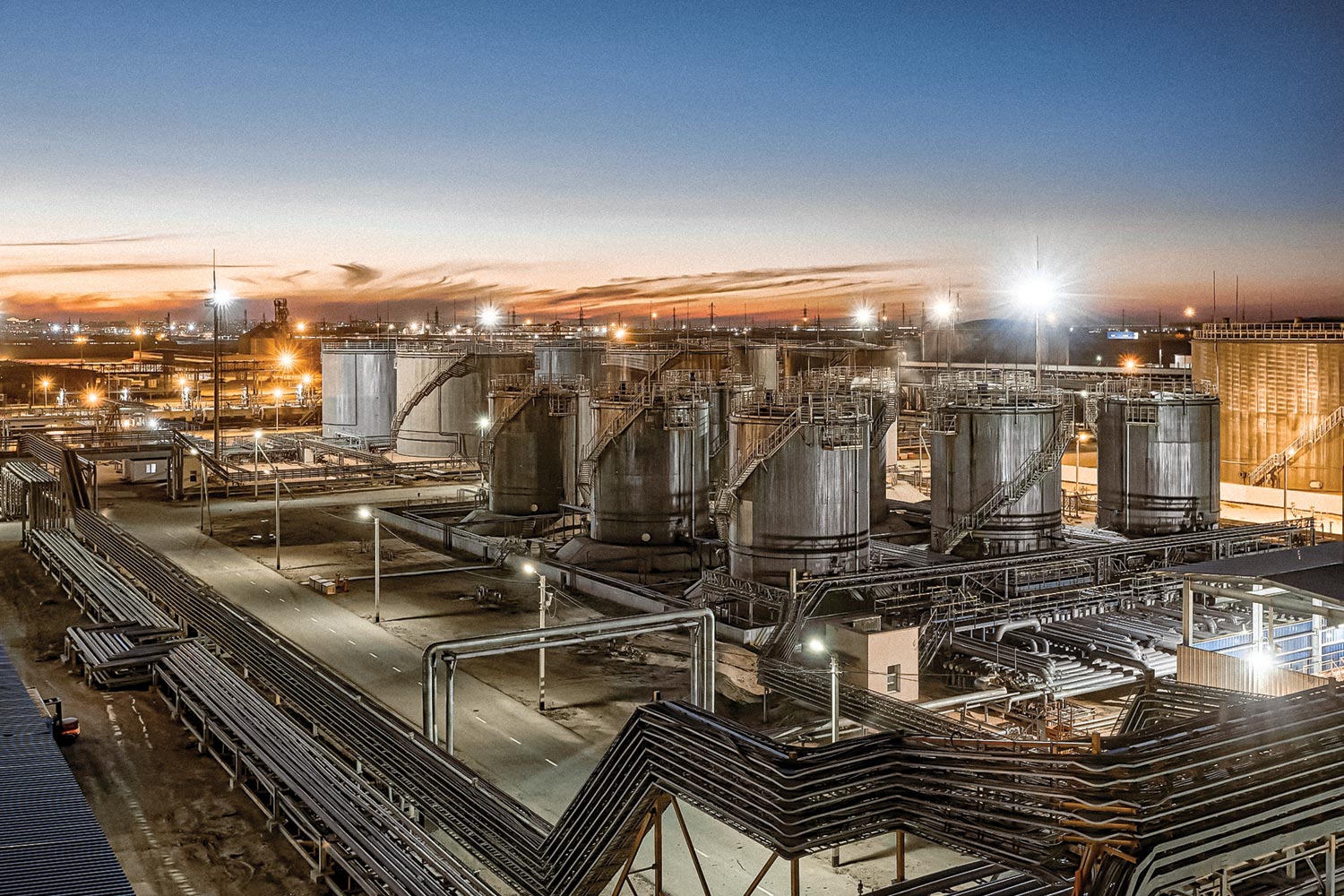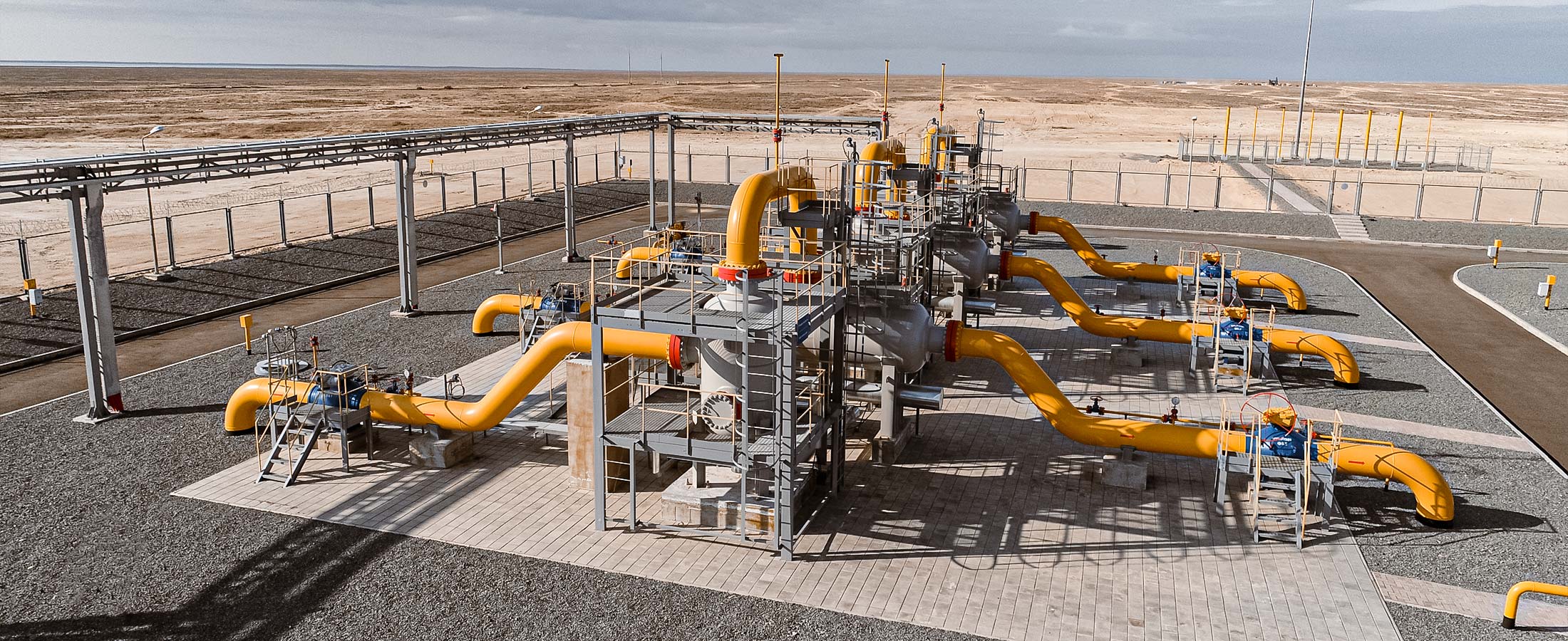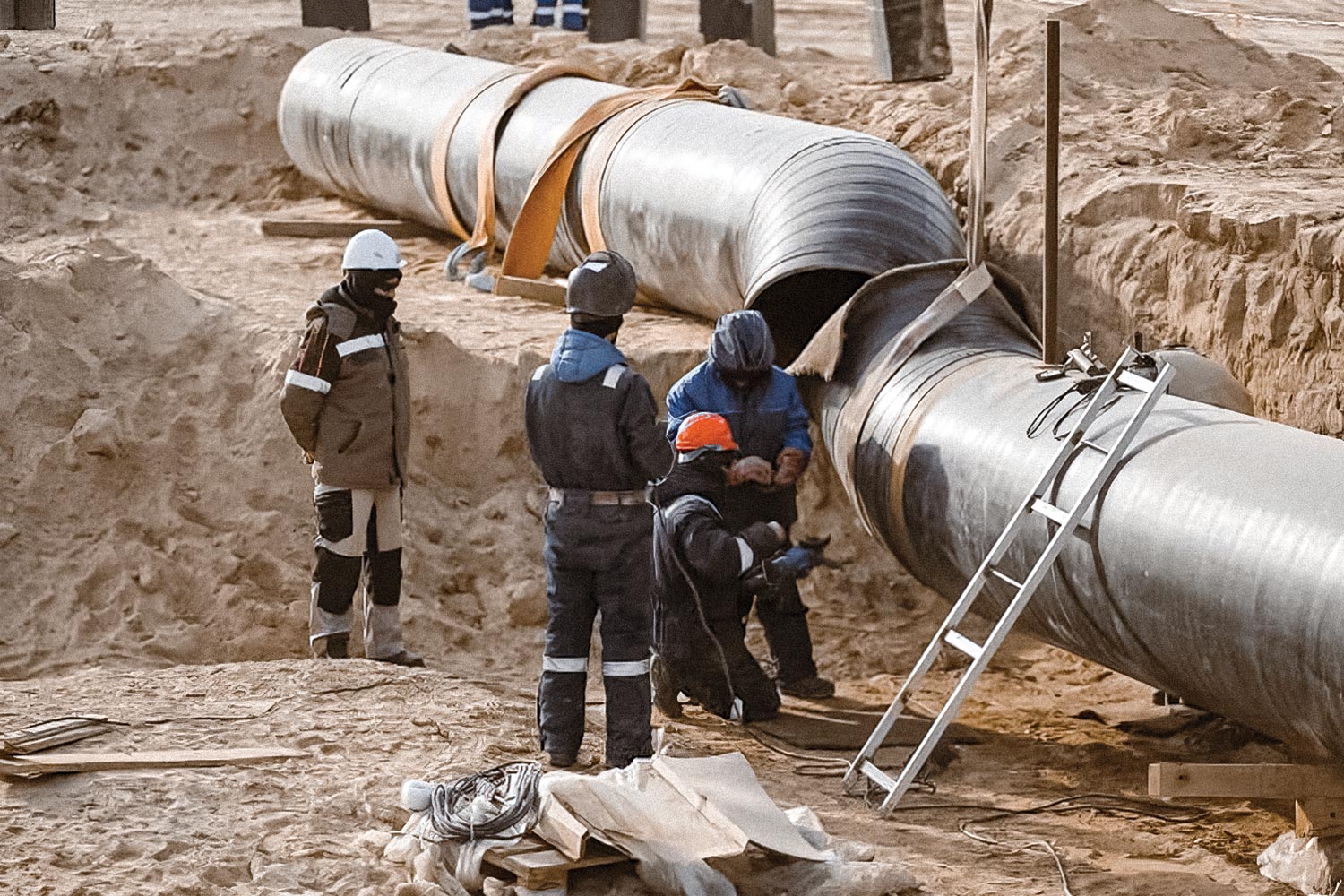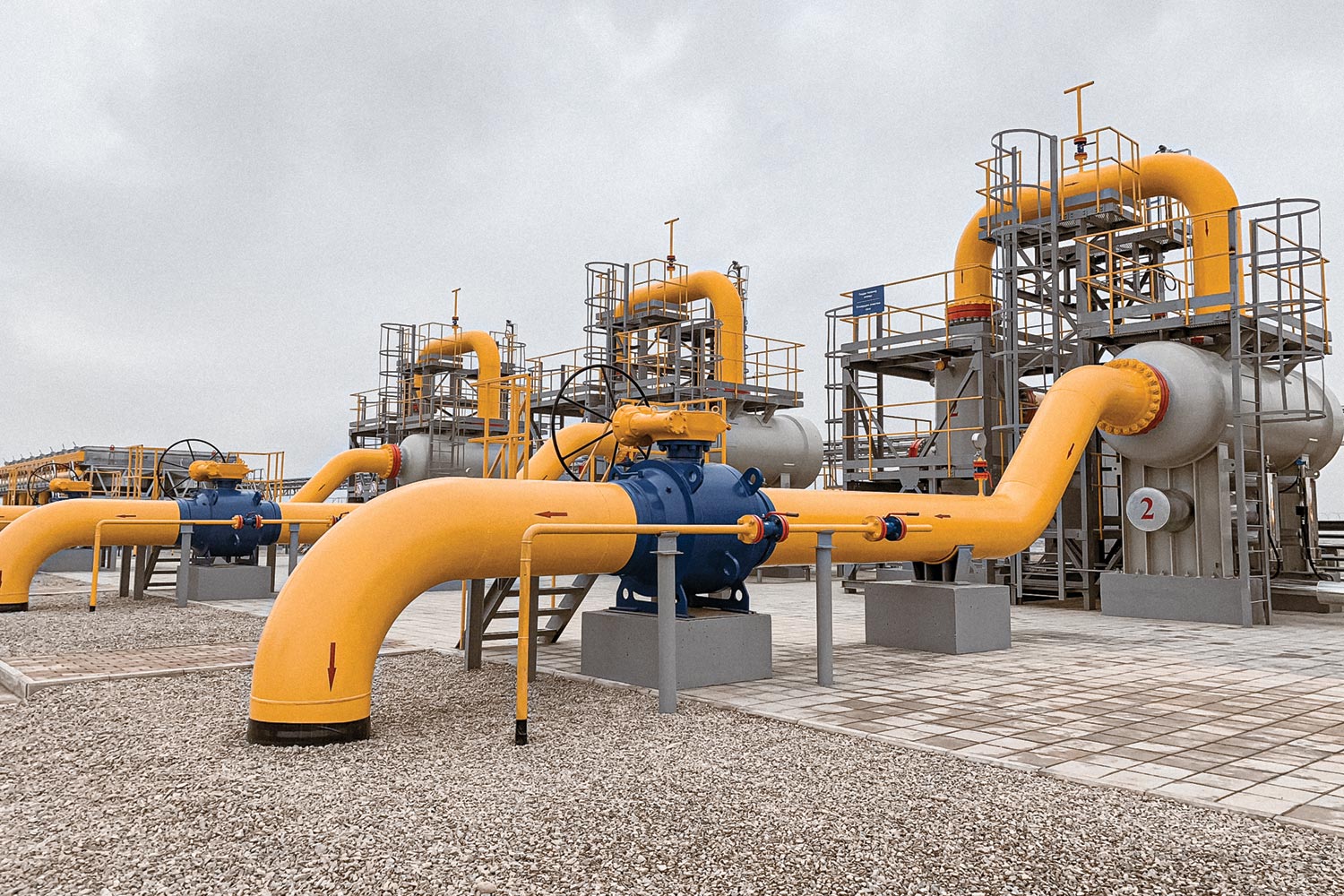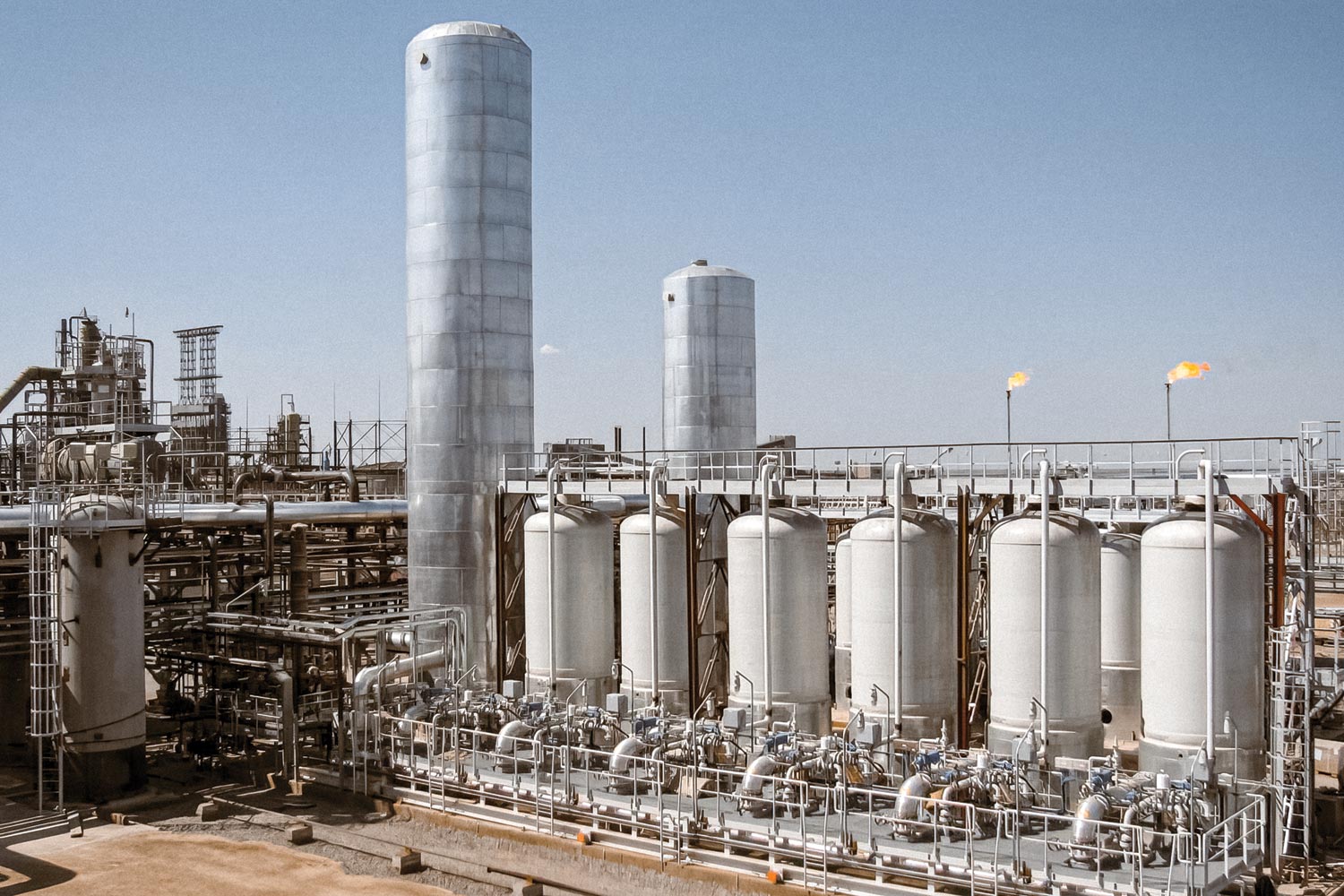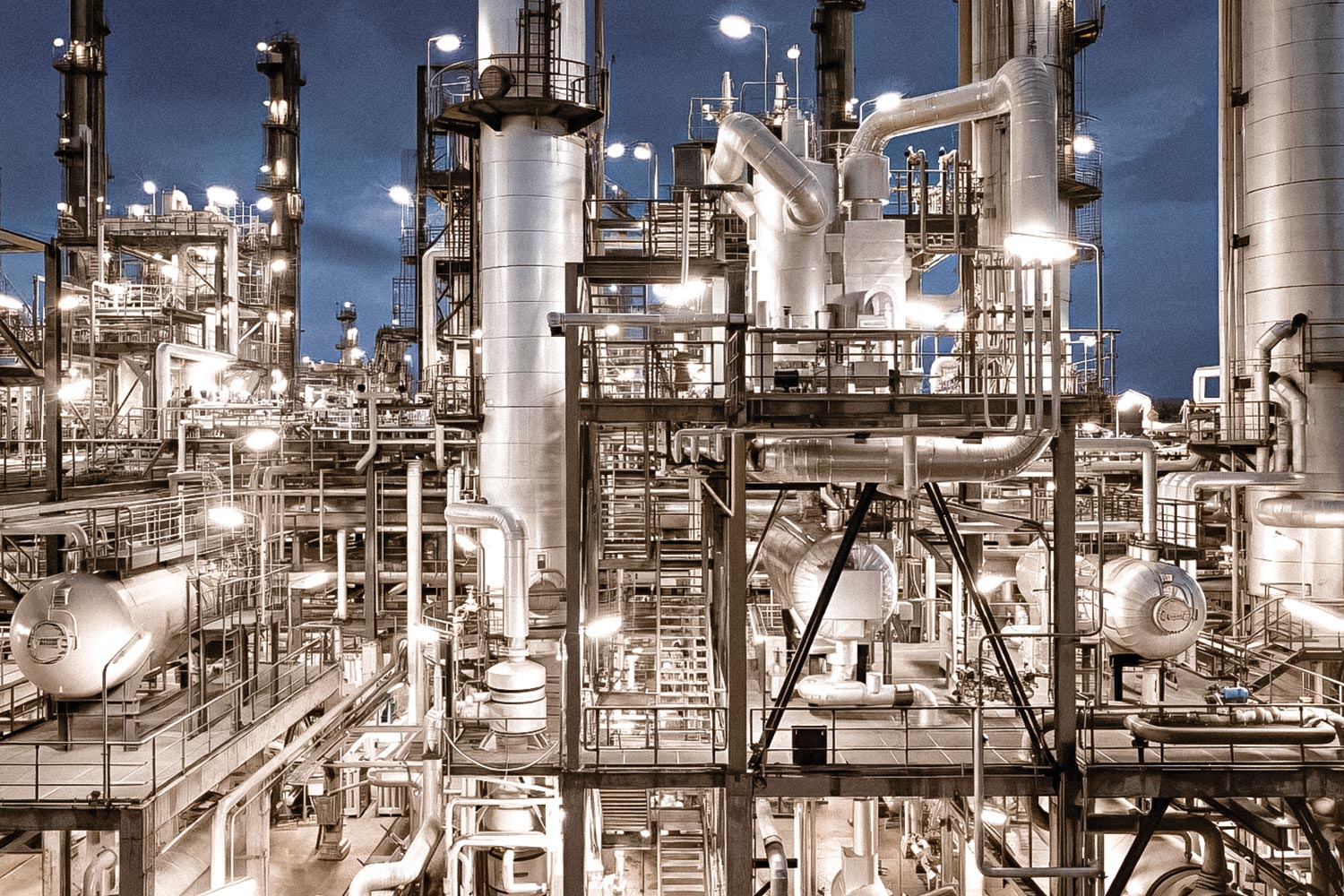Key performance results for 2023
| Indicator |
2022 |
2023 |
| Production indicators, million tons: |
| Oil and gas condensate production volume |
22,0 |
23.5 |
| Oil refining volume6 |
19.9 |
19.6 |
| Oil refining volume in the Republic of Kazakhstan |
14.3 |
14.2 |
| Oil transportation volume |
74.7 |
80.4 |
| Gas production, 7, billion m3 |
8.2 |
9.5 |
| Financial indicators, KZT billion: |
| Revenue |
8,693 |
8,320 |
| Dividends |
200 |
300 |
| Net profit |
1,307 |
925 |
| Costs |
8,028.4 |
8,047.8 |
| Operating profit |
1,698.1 |
1,486.2 |
| Net debt |
2,154 |
1,645 |
| Sustainability indicators: |
| CO2 emissions into the atmosphere, million tons |
7.6 |
11.93 |
| Volume of disposed waste, thousand tons |
693.7 |
1,145 |
| Accidents |
36 |
29 |
| Fatal accidents |
1 |
2 |
6 Minus KMG International N.V.
7 Taking into account exclusion of KazTransGas JSC and its subsidiaries and affiliates from the consolidation perimeter
In 2023, KMG faced a number of challenges, including price fluctuations, geopolitical instability, unofficial export of oil products to neighboring countries, increased competition and various subjective difficulties. Nevertheless, the Company successfully overcame these obstacles, demonstrating growth in all aspects of its operations, covering the value chain from hydrocarbon exploration and production to transportation and refining.
In 2023, an operating company was established to run the Kalamkas Sea and Hazar project, and in parallel basic engineering and design (hereinafter — FEED) work is actively underway.
Seismic and data interpretation works were completed at 5 sites of geological study of subsurface (hereinafter — GSS).
Rehabilitation works were launched at Uzen and Karamandybas fields, where special attention is paid to the integration of advanced technologies and equipment.
At the end of November 2023, the acquisition of a 60% stake from France's TotalEnergies in the Dunga oil and gas field located in the Mangistau region was completed, and negotiations on the purchase of the remaining 40% have also been initiated.
In addition, production was launched at the Rozhkovskoye, East Urikhtau and Aksai South gas fields.
Pre-FEED development was completed for the Karachaganak Gas Processing Plant (hereinafter — GPP) (4.5 billion m3 per year).
As part of the development of the Trans-Caspian international transport route, the Company initiated oil transportation in the direction of Baku and further through the Baku-Tbilisi-Ceyhan pipeline, thanks to which about 1 million tons of oil was shipped in 2023. As part of the strategy of diversification of transport routes, the Company also started oil transportation through the Atyrau-Samara pipeline and further through the Transneft pipeline system to Germany, where the volume of deliveries for the year also amounted to about 1 million tons of oil.
January of the current year was marked by a significant event for the Company: a joint venture with Abu Dhabi Ports from the United Arab Emirates was established, as a result of which two tankers, Taraz and Liwa, each with deadweight of 8 thousand tons, were acquired. These vessels are already actively involved in the transportation of Kazakh oil across the Caspian Sea, with plans to further expand the fleet. In addition, the establishment of a shipbuilding and ship repair enterprise in the Republic of Kazakhstan is being studied.
As part of ensuring uninterrupted operation of the Caspian Pipeline Consortium (hereinafter — CPC), KMG, in agreement with the shareholders of the CPC, entered into a contract with Bluewater (Holland) for the construction of 2 outriggers and their delivery to the CPC marine terminal in 2026.
In 2023, KMG successfully ensured stability in the domestic market of oil products by implementing measures that led to a reduction of “gray” exports in border areas to 20%. The Company is actively working on the transition to a three-year non-stop overhaul period and improving the productivity of oil refineries (hereinafter — refineries). At the Pavlodar Refinery, a new furnace was commissioned at the bitumen production unit, and projects are underway to create hydrogen production units and produce winter diesel fuel.
A pre-feasibility study was completed for the expansion of PetroKazakhstan Oil Products LLP's (hereinafter — PKOP) refinery, and the adaptation process has begun.
CASPI BITUM LLP is actively developing a working project aimed at increasing production capacity from 500 to 750 thousand tons per year.
In addition, the reconstruction and expansion of the first stage of the Astrakhan-Mangyshlak water pipeline has been successfully completed and the construction of the water pipeline at the Kashagan Integrated Gas Treatment Plant has been fully completed, which contributes to improved infrastructure capabilities and operational efficiency.
Hydrocarbon reserves
Recorded proved and probable (2P) hydrocarbon reserves
5,680
million barrels
In 2023, KMG recorded proved and probable (2P) hydrocarbon reserves of 733 million tons of oil equivalent, equal to 5,680 million barrels of oil equivalent. This reflects an increase of 26 million tons compared to the previous year, with a reserve replacement ratio of 110%. The reserves replacement was achieved through increased geological and engineering activities and drilling of wells at Uzen-Karamandybas fields as part of the rehabilitation program, as well as through revised development plans, including geological and engineering activities, operational studies and drilling of new wells at Kashagan, Alibekmola, Novobogatinskoye SE and South Karatobe fields, as well as the development of East and Central Urikhtau fields, including well abandonment.
Net inventories by PRMS (as of December 31, 2023)
| Reserves category, million TOE |
2022
(KMG share) |
2023
(KMG share) |
| Proven (1P) |
486 |
507 |
| Proven plus probable (2P) |
707 |
733 |
| Proven plus probable plus possible (3P) |
816 |
842 |
Exploration and production of oil and gas
KMG's investment portfolio largely consists of oil and gas exploration and production projects both onshore and offshore.
In 2022, in order to enhance the investment potential of the oil and gas sector in Kazakhstan, the Government, in cooperation with international investors and KMG, introduced a training and discipline package providing regulatory and tax incentives for technically complex projects, including new onshore, offshore and gas exploration projects. In December of the same year, the President of Kazakhstan signed amendments to the Code on Subsoil and Subsoil Use and the Tax Code, which stimulated the activation of KMG's projects on the Caspian shelf and complex onshore gas projects.
In 2023, thanks to the training and methodological complex, work on the complex and capital-intensive projects “Kalamkas Sea — Khazar”, “Karaton Podsolevoy” and “Urikhtau” was activated, and the relevant contracts were concluded. In 2024, active exploration work is planned for the Abay and Al-Farabi offshore projects.
In 2022, GSS licenses were obtained for 5 areas: Mugodzhary, Berezovsky, Zharkyn, Bolashak and North Ozen. In 2023, an advance seismic survey was carried out as part of the program of geological study of subsurface resources ahead of schedule. Field seismic exploration works were completed at 3 sites in Mangistau and West Kazakhstan regions. Field work is being carried out at the Mugodzhary site in Aktobe region. The re-processing and re-interpretation of historical profiles for the Bolashak area, as well as the processing and interpretation of seismic data for the North Ozen, Zharkyn and Berezovsky areas are being finalized. In the period 2024-2025 it is planned to complete advanced seismic exploration works with subsequent processing and interpretation of the results, the purpose of which is to reduce geological risks and obtain data for geological and technical and economic evaluation.
In the period 2022-2023, preparatory stages for the drilling of an exploration well were completed within the framework of the Turgai Paleozoic Project, and in 2024 it is planned to implement the drilling of an exploration well to a depth of 5,500 meters. In addition, in 2023, contracts were successfully obtained for the Karaton Podsolevoy and Kalamkas Sea-Khazar areas, after which operating companies were established and strategic partners were engaged for the implementation of each project. Specifically, for the Karaton Podsolevoy area, the first exploration well is scheduled to be drilled in 2024 with the strategic partner funding, with completion of testing anticipated in 2025. For the Kalamkas Sea-Khazar prospect, design work is scheduled to be completed in 2024.
In the Eastern Urikhtau and Rozhkovskoye field development projects, the pilot operation stages have been completed. The event of November 2023 was the launch of production at the Vostochny Urikhtau project. Also in December 2023, well U-21 was put into operation under the Rozhkovskoye Field Development project, which demonstrates the progress and effectiveness of the Company's development plans.
In 2024 it is planned to implement the drilling of an exploration well to a depth of
5,500
meters
Drilling of an exploration well was completed in 2023 at the Zhenis prospect in the Kazakhstan sector of the Caspian Sea. The drilling results did not reveal oil and gas deposits and it was decided to stop further exploration in this area. The risk of non-discovery of oil and gas deposits was realized at the expense of a strategic partner in the project.
The Company continues to increase reserves through additional exploration of existing onshore fields. Additional exploration is underway at the Karasor West field of Embamunaigas JSC. It is planned to drill two appraisal wells and complete design and survey work on the field development in 2024.
Hydrocarbon production
KMG's oil and gas condensate production in 2023 amounted to 23,532 thousand tons (486 thousand barrels per day), up 6.9%. Production of associated and natural gas (before reinjection) increased by 14.8% to 9,460 million m3.
In 2023, the Tengiz field saw a 1.0% decrease in oil production to 5,779 thousand tons (126 thousand barrels per day). The decrease in production was due to the suspension of oil intake in the CPC system during scheduled maintenance of the oil pipeline and downtime at the marine terminal due to unfavorable weather conditions in the fourth quarter.
Associated gas production decreased by 0.9% to 3,202 million m3.
At the Kashagan field, KMG's share in oil production reached 3,108 thousand tons (68 thousand barrels per day), showing an increase of 121.8%, while gas production increased by 123.8% to 1,963 million m3. The production growth was mainly due to the increase of KMG's share in the project from 8.44% to 16.88% as a result of the completion of the buy-back of 50% of KMG Kashagan B.V. from Samruk- Kazyna JSC in September 2022, as well as due to the shutdown of production in the summer of 2022 and the overhaul and rehabilitation of the offshore and onshore complexes.
At Karachaganak, oil and condensate production increased by 7.1% to 1,086 thousand tons (23 thousand barrels per day) and gas production increased by 15.1% to 2,239 million m3. The growth in production was driven by an increase in the ability to receive crude gas from the Orenburg gas processing plant.
In 2023, oil and condensate production at KMG's operating assets decreased by 1.5% to 13,559 thousand tons (269 thousand barrels per day). Emergency power outages and power restrictions emanating from the Mangistau Nuclear Power Plant from July to September had a significant impact on the production decline at the Ozenmunaigas fields and other areas. Production declines are also observed at brownfields as a result of natural production decline. However, this decline was partially offset by an increase in production at Embamunaigas fields following successful geological and engineering measures, including at the East Wing of the field S. Nurzhanov and Uaz North.
In November 2023, KMG successfully completed the purchase of 100% of Total E&P Dunga GmbH from TotalEnergies EP Danmark A/S, a subsidiary of TotalEnergies S.E., thereby increasing its stake in the Dunga project to 60%. The Dunga oil and gas field, located in the Tupkaragan district of the Mangistau region, was discovered in 1966 and has geological reserves of 93 million tons of oil and more than 7 billion m3 of gas.
Three gas projects were launched in 2023. On May 10, 2023, JV Kazgermunai LLP started supplying gas from the Aksai Yuzhny field. The field is being developed by JV Kazgermunai LLP, where KMG holds a 50% interest. On November 29, 2023, Urikhtau Operating, with KMG 100% participation, put into commercial operation the Eastern Urikhtau field, which is the first in the Republic of Kazakhstan to apply the Enhanced Model Contract. On December 21, 2023, Ural Oil and Gas, 50% owned by KMG, put into commercial operation the Rozhkovskoye gas condensate field in the West Kazakhstan region.
Oil and condensate production in 2023, thousand tons
| Oil and condensate production |
2022
(KMG share) |
2023
(KMG share) |
| Ozenmunaigas |
5,096 |
4,877 |
| Mangistaumunaigas |
3,049 |
3,075 |
| Embamunaigas |
2,581 |
2,722 |
| Tengiz |
5,836 |
5,779 |
| Kashagan8 |
1,400 |
3,108 |
| Karachaganak |
1,013 |
1,086 |
| Others |
3,036 |
2,883 |
| Total |
22,011 |
23,520 |
8 KMG's share in the project 16.88% after September 15, 2022.
Tengiz, Kashagan, Karachaganak megaprojects
KMG is actively involved in key oil and gas projects, including Tengiz (20%), Kashagan (16.87%) and Karachaganak (10%), working together with strategic investors. At Tengiz, the “Wellhead Pressure Management Project/Future Expansion Project”, aimed at increasing annual oil production by 12 million tons, is progressing well. As of the end of 2023, the project has made significant progress of 99.3%, with full completion of mechanical works. The Joint Production Control Center has also been commissioned, and preparation of systems for operation and commissioning has commenced.
The Karachaganak field is actively pursuing projects to maintain production levels. In 2023, a concept was developed for the construction of a gas processing plant with an annual capacity of 4 billion m3 of marketable gas, which facilitates the monetization of recovered raw materials and their processed products. For 2024, the “Fifth Gas Injection Compressor (5IC) Installation Project” is scheduled for completion, while the “Sixth Gas Injection Compressor Installation Project” is under active construction, with 43% completion of the total works.
Oil production from the Kashagan field is being carried out as part of the Phase 1 development. Within Phase 2 of the field development, projects are currently under consideration to increase oil and condensate production levels over the next 10 years to ~710 thousand barrels per day (~89.5 thousand tons per day).
Oil transportation
The volume of oil transportation through main pipelines increased by
6.5%
The total volume of trunk and marine oil transportation increased by 7.6% to 80,359 thousand tons. In December 2022, the “CPC Oil Pipeline System Bottleneck Elimination Project”, which allows increasing the capacity of the CPC pipeline to 80 million tons per year, ensured readiness to increase oil pumping volumes to 81.5 million tons per year. In 2023, the Tengiz and Atyrau oil pumping stations were completed and put into operation.
The volume of oil transportation through main pipelines increased by 6.5% and amounted to 69,581 thousand tons. The growth was due to an increase in oil transportation for export through the KazTransOil system in the direction of Germany, oil shipment through the port of Aktau in the direction of Baku-Tbilisi-Ceyhan, as well as an increase in oil delivery from the Kashagan field to the CPC system.
The total volume of sea transportation of oil in the reporting year increased by 15.4% to 10,778 thousand tons. The increase in transportation volumes was mainly due to an increase in exports of Kazakh oil via the Aktau port-Baku port route and further via the Baku-Tbilisi-Ceyhan pipeline.
In 2023, the joint project of KMTF and International Maritime Investments Ltd — “Acquisition of 2 oil tankers with deadweight of 8,000 tons” — was completed. The tankers meet all international safety standards and environmental requirements. Since 2024 tankers “Taraz” and “Liwa” are involved in oil transportation on the Aktau-Baku route. These tankers will fully cover the obligations of the Kazakh side to transport 750,000 tons of oil per year along the Aktau-Baku route.
Oil transportation volume in 2023, thousand tons
| Oil transportation9 |
2022
(KMG share) |
2023
(KMG share) |
| KazTransOil |
40,656 |
44,188 |
| Kazakhstan-China Pipeline |
9,618 |
9,403 |
| MunaiTas10 |
2,859 |
2,819 |
| Caspian Pipeline Consortium |
12,183 |
13,171 |
| Kazmortransflot |
9,343 |
10,778 |
| Total |
74,658 |
80,359 |
9 Some crude oil volumes may be transported by two or three pipeline companies and, accordingly, these volumes are accounted for more than once in the consolidated volume of crude oil transportation.
10 MunaiTas is an equity consolidated joint venture and therefore transportation volumes are shown according to a 51% ownership interest.
Refining and marketing of petroleum products
Refining volumes at KMG International (Petromidia, Vega) in Romania
5,387
thousand tons
The volume of hydrocarbon feedstock processed at Kazakhstan refineries decreased by 0.4% to 14,206 thousand tons. The decrease in refining throughput was mainly at the PKOP refinery due to lower utilization in the middle of the reporting year due to unscheduled repair of the heat exchanger at the catalytic reforming and catalyst regeneration unit. The increase in refining volumes at Atyrau Refinery in 2023 partially offset the decrease at PKOP.
Refining volumes at KMG International (Petromidia, Vega) in Romania decreased by 4.3% to 5,387 thousand tons. The decrease in refining volume followed an incident at the soft hydrocracking unit in mid-summer 2023. Remediation work at the unit continues, with completion delayed to 2024, due to the large volume of reactor remediation work associated with ensuring the integrity of the equipment and the continued safe operation of the unit.
Hydrocarbon feedstock processing volume in 2023, thousand tons
| Hydrocarbon feedstock processing |
2022
(KMG share) |
2023
(KMG share) |
| Atyrau Oil Refinery |
5,224 |
5,475 |
| Pavlodar Oil Chemistry Refinery |
5,480 |
5,434 |
| PKOP11 |
3,103 |
2,870 |
| Caspi Bitum12 |
461 |
427 |
| Petromidia |
5,258 |
5,012 |
| Total |
19,526 |
19,593 |
11 The volume of PKOP and Caspi Bitum processing is indicated at a share of 50%.
12 The processing volume of PKOP and Caspi Bitum is indicated at a share of 50%, while the other plants have a share of 100%.
Production of petroleum products at Kazakhstani and Romanian refineries decreased by 2.7% to 18,138 thousand tons in 2023. Kazakhstan refineries produced 12,951 thousand tons of petroleum products, which is 1.3% less than in 2022 due to lower utilization at PKOP refinery. KMG International refineries (Petromidia, Vega) produced 5.3% less petroleum products, which amounted to 5,221 thousand tons compared to 5,512 thousand tons a year earlier.
KMG faces the important task of supplying Kazakhstan's domestic market with domestic oil products against the backdrop of expected consumption growth. In response to this, the Company started implementing measures to improve the reliability of equipment at the Atyrau Oil Refinery and Pavlodar Oil Chemistry Refinery, aiming to increase the period between repairs to three years and to increase the production of light oil products at the Atyrau Oil Refinery by processing Tengiz oil.
To address the problematic issues related to the shortage of bitumen in the domestic market, KMG started implementation of the project to increase the capacity of JV CASPI BITUM LLP on oil refining to 1.5 million tons per year with production of road bitumen up to 750 thousand tons per year. Realization of this project will allow to continuously provide bitumen to the road sector of the country from 2025.
The study of expansion of Pavlodar Oil Chemistry Refinery capacity continues. The pre-feasibility study for the project is scheduled for completion in 2024.
In the direction of oil marketing development, projects implemented by KMG-Aero were included in KMG's investment portfolio in 2023. The projects provide for investments in construction and/or modernization of fuel refueling complexes at key airports of the country for storage of Jet A-1, RT/TS-1 jet fuel and will allow to provide services for storage and refueling of fuel “on the wing” to domestic and foreign airlines without intermediaries.

Oil and gas chemistry
As part of its strategy to diversify its business and expand its product portfolio, KMG intensified its efforts to form an oil and gas chemical cluster in Kazakhstan, opening a new page in the Company's development. Since December 2022, a polypropylene production line at the plant of KPI Inc. LLP has been in operation with an annual production capacity of up to 500 thousand tons. In 2023, the plant produced 180 thousand tons of polypropylene, serving the markets of Kazakhstan, China, European countries, and CIS. To date, production of 6 grades of products has been mastered KMG in cooperation with key partners, including SIBUR and Sinopec, is constructing a polyethylene plant with a planned production capacity of 1,250 thousand tons per year, where design work is already underway.
In addition, KMG is implementing infrastructure projects, including the construction of a gas separation complex and trunk pipelines for transportation of ethane and propane, in order to provide resources for the future polyethylene plant.
Since December 2022, a polypropylene production line at the plant of KPI Inc. LLP has been in operation with an annual production capacity of up to
500
thousand tons
Dividends
In 2023, KMG paid dividends in favor of Shareholders in the amount of KZT 300 billion.
Plans for 2024
In 2024, KMG sets ambitious and broad goals, demonstrating its commitment to development. With the discovery of new oil and gas deposits in various fields, the Company plans to expand its energy production operations.
The Company has set a target for oil production during 2024 of over
23
million tons
This approach is critical to meeting its obligations to the Government and shareholders, emphasizing KMG's reputation as a reliable and strategic player in the energy sector. As part of these strategic plans, the Company has set a target for oil production of over 23 million tons during 2024.
The Company has also decided to study the possibility of constructing a plant for the production of polyethylene terephthalate. Within this direction PetroChem LLP in partnership with Sinopec started to prepare a pre-feasibility study for this project.
The Company has developed a geological exploration strategy with the prospect of increasing reserves through both internal development and acquisitions. As part of this strategy, drilling activities are planned for the next five years in key areas such as the Turgai Paleozoic (KMG), Abai (Eni) and Karaton Podsolovoy (Tatneft), emphasizing the active pursuit of expanding and strengthening the resource base.
Particular importance is attached to the completion of the construction of a 120 MW hybrid power plant implemented jointly with Eni in the Mangistau region. This unique hybrid project in Kazakhstan combines solar (50 MW), wind (77 MW) and gas (120 MW) power plants, providing electricity generation for KMG's subsidiaries in the region.
KMG attaches great importance to the provision of clean drinking water to the population. In the context of social responsibility, the Company is constructing a new desalination plant in the Mangistau region. In addition, KMG plans to expand its activities in the oil and gas chemical industry, including the construction of a gas chemical complex to produce polyethylene.
Gas supply to the domestic market
National Company QazaqGaz JSC (hereinafter — QazaqGaz) is a vertically integrated gas company engaged in management of centralized infrastructure for transportation of marketable gas through main gas pipelines and gas distribution networks, as well as provision of international transit and sale of gas in domestic and foreign markets.
Annual throughput capacity
240
billion m3
In addition, QazaqGaz participates in designing, financing construction and operation of pipelines and gas storage facilities in the territories of presence in 14 regions and 3 cities of republican importance — Astana, Almaty and Shymkent.
QazaqGaz, as a national operator in the field of gas and gas supply, manages the largest network of main gas pipelines, the length of which increases annually and currently exceeds 21.2 thousand km (including gas pipelines — branches of 3 thousand km), and gas distribution networks, the length of which is more than 68.7 thousand km.

